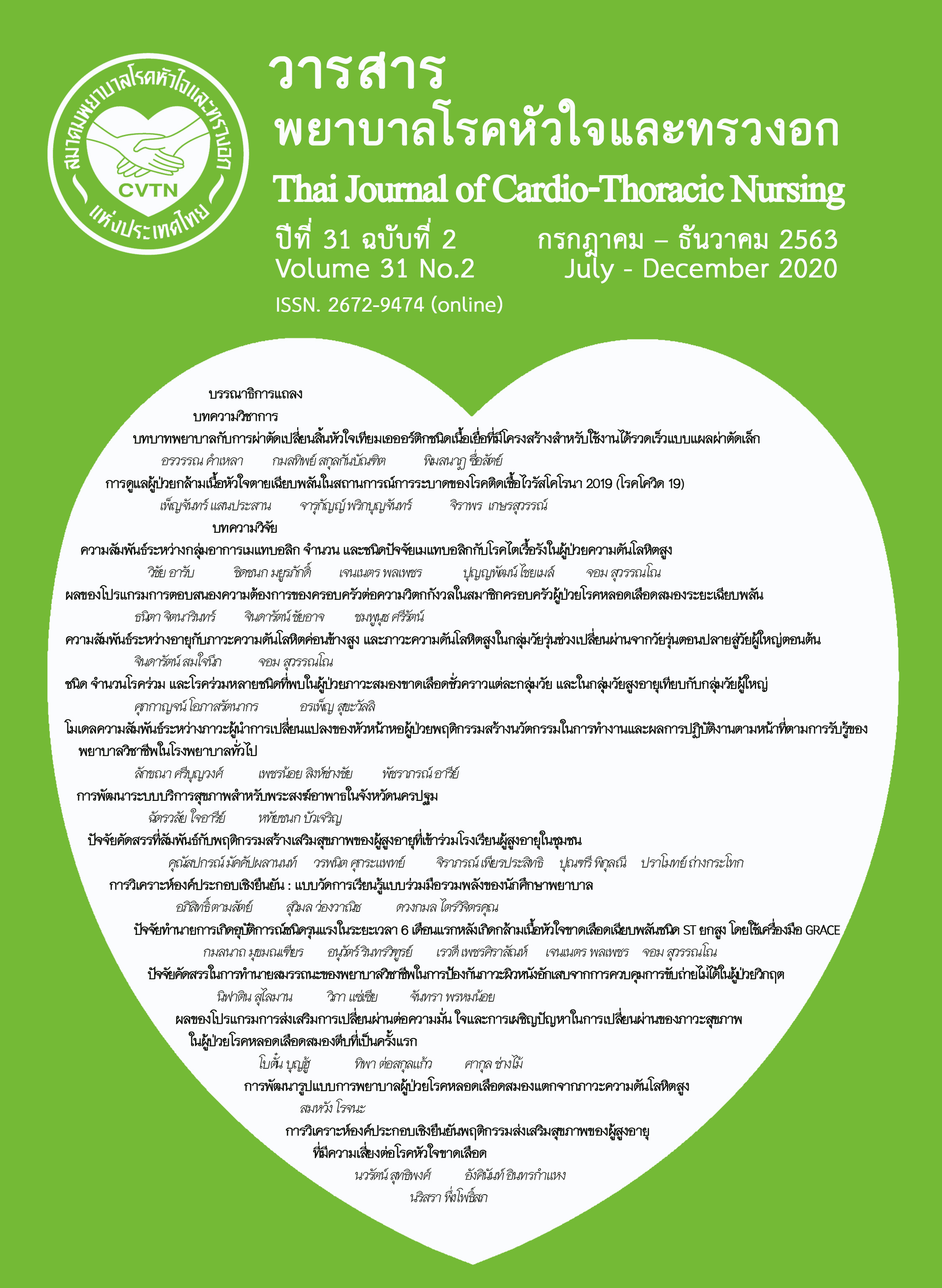The development of a nursing care model for hemorrhagic stroke patients from hypertension
Keywords:
nursing care model, hemorrhagic stroke patients, hypertensionAbstract
This study of research and development was aimed to develop and to study outcomes of a nursing care model of hemorrhagic stroke patients from hypertension. The samples consisted of: 1) 14 multidisciplinary team (2 physicians and 12 registered nurses), 50 registered nurses, 42 patients with hemorrhagic stroke from hypertension and caregivers in each group. The study were divided into 4 phases as follows: 1st phase: situational analysis using focus group discussion of multidisciplinary team 12 persons, 2nd phase: develop nursing care model by using evidence based practice (EBP) of Soukup, 3rd phase: implementing of nursing care model, and 4th phase: outcomes evaluation were assessed. The instruments comprised nursing care model developed from EBP, and knowledge of using a model, assessment of caregiver’ knowledge and ability, questionnaire of nurses and caregivers’ satisfaction including clinical outcomes evaluation form. Data were analyzed using content analysis, descriptive statistics and paired t-test statistic.
The results showed that a nursing care model consisted of admission, nursing care, discharge planning and referral system. After implementation of a model, outcomes evaluation assessed the effective of a model as: 1) the knowledge of registered nurses was improved statistically significant at p<0.05, 2) registered nurses’ satisfaction were at the highest level (mean=4.28, S.D.=0.36), 3) the knowledge of care givers were improved statistically significant at p<0.05, 4) 94.49 % of caregivers could pass the evaluation and had abilities of caring patients with Stroke, 5) caregivers’ satisfaction were at the highest level (mean=4.30 , S.D.=0.28), and 6) evaluation of important clinical outcomes found three cases of ventilator association pneumonia, no mortality rate, and no pressure sore, including length of stay, and cost of care were decreased.
This nursing care model of hemorrhagic stroke patients from hypertension should be applied to care for Stroke patients at surgical ward to prevent complications and provide continuing care from hospital to home care.
References
World Health Organization. Global status report on noncommunicable diseases 2014 [document on the Internet]. Geneva, Switzerland: WHO; 2014 [update 2020 June 14; cited 2020 June 14]. Available from: https://www.who.int/nmh/publications/ncd-status-report-2014/en/.
Bureau of Non-Communicable Diseases, Ministry of Public Health. World Stroke Day 2016. Bangkok: Bureau of Non-Communicable Diseases; 2016. (in Thai).
Strategy and Planning Division, Ministry of Public Health. Public Health Statistics 2017. Bangkok: Siam Charoen Commercial; 2018. (in Thai).
Medical Information Group, Phra Narai Maharaj Hospital. Patient statistics report, Phra Narai Maharaj Hospital. Lopburi; 2019 (in Thai).
Department of Surgery, Phra Narai Maharaj Hospital. Indicators of surgical service quality, Phra Narai Maharaj Hospital. Lopburi; 2019. (in Thai).
Chantra R, Sansuwan R, Heeaksorn C. Care for stroke patients with a multidisciplinary team. Journal of Royal Thai Army Nurses 2017; 18(suppl): 49-55. (in Thai).
Kusum V, Takarnvanich T, Kamwicha P, Chotnopparatpattara P, Krongyuth S, Charuwanno R, et al. Critical care nursing: a holistic approach. 6th Edition. Bangkok: Saha Pracha Panich Inc; 2017. (in Thai).
Barker EM. Neuroscience Nursing: a spectrum of care. 3rd Edition. Missouri: Mosby Elsevier; 2008.
Punjaisee S, Phuenpathom N, Veerasarn K, Charnnarong N, Khaoroptham S, Siwanuwatn R, et al. Clinical practice guidelines for hemorrhagic stroke. Bangkok: Tana Press Co., Ltd; 2013. (in Thai).
Wiwattrakul K, Anosri L. The caring model development of acute stroke’s patients at Kalasin Hospital. Journal of Nursing Division 2017; 44(2): 26-45. (in Thai).
Wiwanpong C. Development of care for hemorrhagic stroke patients in Surgical Intensive Care Unit, Yasothon Hospital. An Independent study report for the Master of Nursing Science in adult nursing, faculty of nursing, Khon Kaen university; 2012. (in Thai).
Rattanapathumwong P, Yeaujaiyen M. Practice Guidelines for pain management among postoperative patients in the post-anesthesia care unit in Ranong Hospital. Journal of Boromarajonani College of Nursing 2014; 30(1): 86-99. (in Thai).
Tilokskulchai F. Evidence-based nursing: principle and method. 3rd Edition. Bangkok: Pre One Part., Ltd.; 2008. (in Thai).
Soukup M. The center for advanced nursing practice evidence-based practice model. Nurs Clin N Am. 2002; 35(2): 301-309
Cohen J. Statistical power analysis for behavioral sciences. New York: Academic Press; 1988.
Srisatidnarakul B. The methodology in nursing research. 3rd Edition. Bangkok: You and I Inter Media; 2007. (in Thai).
The Joanna Briggs Institute. Joanna Briggs Institute Reviewers’ Manual 2011 Edition. Australia: The Joanna Briggs Institute; 2011.
Kedsing W. Mean and meaning translation. Education newsletter.1995;18(3):8-11.
Tantivisut S, Namvongprom, Sirikul S. Effectiveness of Nursing System Development in Using Evidence-based Protocol on Quality of Care in Patients with Severe Traumatic Brain Injury. Nurs Health Care. 2011; 29(3): 5-13.
Considine J, McGillivry B. An evidence-base practice approach to improve nursing care of acute stroke in an Australian Emergency Department. Clin Nurs. 2010; 1: 138-144.
Srihabundit W, Kimsungnoen N, Namjuntra R. Needs of the caregivers of patients with cerebrovascular disease and the predicting factors of their needs. [Master Thesis of Nursing Science]. Pathum Thani: Rangsit University; 2018. (in Thai).
Paksee N, Sirapo-ngam Y, Monkong S, Leelacharas S. Effects of a transitional care program for stroke patients and family caregivers on caregiver’s preparedness, stress, adaptation, and satisfaction. Ramathibodi Nursing Journal 2016; 22(1): 65-80. (in Thai).
Downloads
Published
How to Cite
Issue
Section
License
บทความนี้ยังไม่เคยตีพิมพ์หรืออยู่ในระหว่างส่งไปตีพิมพ์ในวารสารอื่น ๆ มาก่อน และกองบรรณาธิการขอสงวนสิทธิ์ในการตรวจทาน และแก้ไขต้นฉบับตามเกณฑ์ของวารสาร ในกรณีที่เรื่องของท่านได้ได้รับการตีพิมพ์ในวารสารฉบับนี้ถือว่าเป็น ลิขสิทธิ์ของวารสารพยาบาลโรคหัวใจและทรวงอก






